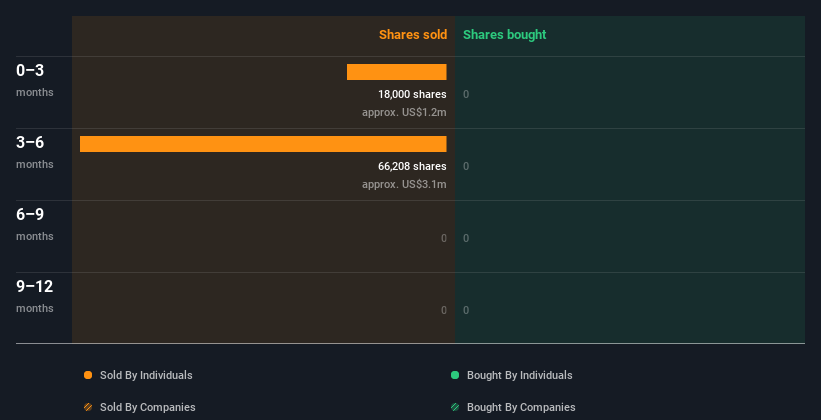- United States
- /
- Consumer Finance
- /
- NYSE:SYF
Synchrony Financial Insiders Sell US$4.3m Of Stock, Possibly Signalling Caution

Many Synchrony Financial (NYSE:SYF) insiders ditched their stock over the past year, which may be of interest to the company's shareholders. When evaluating insider transactions, knowing whether insiders are buying is usually more beneficial than knowing whether they are selling, as the latter can be open to many interpretations. However, when multiple insiders sell stock over a specific duration, shareholders should take notice as that could possibly be a red flag.
While insider transactions are not the most important thing when it comes to long-term investing, logic dictates you should pay some attention to whether insiders are buying or selling shares.
Check out our latest analysis for Synchrony Financial
Synchrony Financial Insider Transactions Over The Last Year
In the last twelve months, the biggest single sale by an insider was when the Executive VP & CFO, Brian Wenzel, sold US$3.1m worth of shares at a price of US$46.73 per share. That means that an insider was selling shares at slightly below the current price (US$64.27). As a general rule we consider it to be discouraging when insiders are selling below the current price, because it suggests they were happy with a lower valuation. While insider selling is not a positive sign, we can't be sure if it does mean insiders think the shares are fully valued, so it's only a weak sign. It is worth noting that this sale was only 46% of Brian Wenzel's holding.
In the last year Synchrony Financial insiders didn't buy any company stock. You can see a visual depiction of insider transactions (by companies and individuals) over the last 12 months, below. If you click on the chart, you can see all the individual transactions, including the share price, individual, and the date!

If you are like me, then you will not want to miss this free list of small cap stocks that are not only being bought by insiders but also have attractive valuations.
Insiders At Synchrony Financial Have Sold Stock Recently
The last quarter saw substantial insider selling of Synchrony Financial shares. Specifically, Executive VP & Chief Risk and Legal Officer Jonathan Mothner ditched US$1.2m worth of shares in that time, and we didn't record any purchases whatsoever. Overall this makes us a bit cautious, but it's not the be all and end all.
Insider Ownership
For a common shareholder, it is worth checking how many shares are held by company insiders. I reckon it's a good sign if insiders own a significant number of shares in the company. It's great to see that Synchrony Financial insiders own 0.7% of the company, worth about US$162m. Most shareholders would be happy to see this sort of insider ownership, since it suggests that management incentives are well aligned with other shareholders.
So What Does This Data Suggest About Synchrony Financial Insiders?
An insider sold Synchrony Financial shares recently, but they didn't buy any. Looking to the last twelve months, our data doesn't show any insider buying. But it is good to see that Synchrony Financial is growing earnings. The company boasts high insider ownership, but we're a little hesitant, given the history of share sales. While it's good to be aware of what's going on with the insider's ownership and transactions, we make sure to also consider what risks are facing a stock before making any investment decision. Every company has risks, and we've spotted 2 warning signs for Synchrony Financial (of which 1 is significant!) you should know about.
If you would prefer to check out another company -- one with potentially superior financials -- then do not miss this free list of interesting companies, that have HIGH return on equity and low debt.
For the purposes of this article, insiders are those individuals who report their transactions to the relevant regulatory body. We currently account for open market transactions and private dispositions of direct interests only, but not derivative transactions or indirect interests.
If you're looking to trade Synchrony Financial, open an account with the lowest-cost platform trusted by professionals, Interactive Brokers.
With clients in over 200 countries and territories, and access to 160 markets, IBKR lets you trade stocks, options, futures, forex, bonds and funds from a single integrated account.
Enjoy no hidden fees, no account minimums, and FX conversion rates as low as 0.03%, far better than what most brokers offer.
Sponsored ContentNew: Manage All Your Stock Portfolios in One Place
We've created the ultimate portfolio companion for stock investors, and it's free.
• Connect an unlimited number of Portfolios and see your total in one currency
• Be alerted to new Warning Signs or Risks via email or mobile
• Track the Fair Value of your stocks
Have feedback on this article? Concerned about the content? Get in touch with us directly. Alternatively, email editorial-team (at) simplywallst.com.
This article by Simply Wall St is general in nature. We provide commentary based on historical data and analyst forecasts only using an unbiased methodology and our articles are not intended to be financial advice. It does not constitute a recommendation to buy or sell any stock, and does not take account of your objectives, or your financial situation. We aim to bring you long-term focused analysis driven by fundamental data. Note that our analysis may not factor in the latest price-sensitive company announcements or qualitative material. Simply Wall St has no position in any stocks mentioned.
About NYSE:SYF
Synchrony Financial
Operates as a consumer financial services company in the United States.
Undervalued with excellent balance sheet.
Similar Companies
Market Insights
Community Narratives



